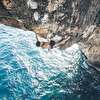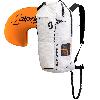Jost Kobusch climbs Denali’s Messner Couloir solo and in winter

 1 / 5
1 / 5 Jost Kobusch
Jost Kobusch
"He has done it! At 13.03 CET yesterday, Sunday February 19, 2023, Jost Kobusch stood at the top of Denali, North America's highest mountain peak." There is little else to add to this clear message, shared by the German climber's staff on social media. Success came about in a brace of shakes, as the German mountaineer had set off for Alaska at the start of February and, after reaching the base of the mountain, was waiting for a suitable weather window.
Kobusch’s goal was to make a solo winter ascent up the West Buttress, to 4330m and then climb the Messner Couloir in a single push. The latter had never successfully been climbed before in winter. Established between 6 and 13 June 1977 by Reinhold Messner and Oswald Ölz, this couloir leads off from the West Buttress a few hundred meters above 4000 meters and nowadays is regarded as one of the most sought-after extreme ski descents.
Kobusch succeeded on his first attempt. "Jost started his single push ascent from his high camp on Saturday 18 February at 3pm CET and arrived back in camp 35 hours later." A non-stop ascent that makes the 30-year-old "the first non-America to successfully climb Denali solo in winter", as well as being the first person to climb the Messner Couloir in winter. This success comes after a previous attempt in winter 2018/2019 that was aborted due to the US government Shutdown which prevented him from obtaining the necessary permit to climb above 4000m.
Satellite communication problems
Despite the possibility of following the climber's progress via live tracking, Kobusch's staff preferred to make the announcement only after having managed to speak to him. The reason? "The live tracking on the website has not been entirely reliable." In fact, the GPS line drawn begins its return before reaching the mountain top. But as the staff explained "in the satellite text message that Jost sent at 1.03pm yesterday Sunday, the GPS coordinates indicate that he did indeed stand at the top of Denali". This live tracking problem has often occurred in the past. "The short time spent at the summit was not enough for an extra signal" the staff pointed out. "The conditions were too extreme. Next time we’ll increase the tracking interval."



 Copia link
Copia link

























